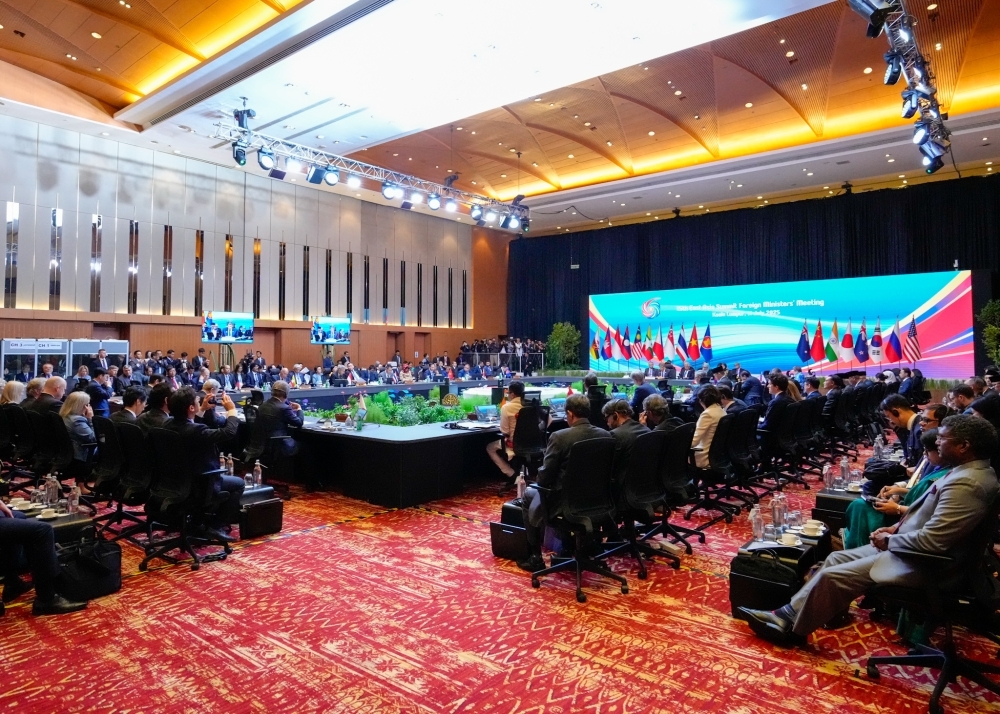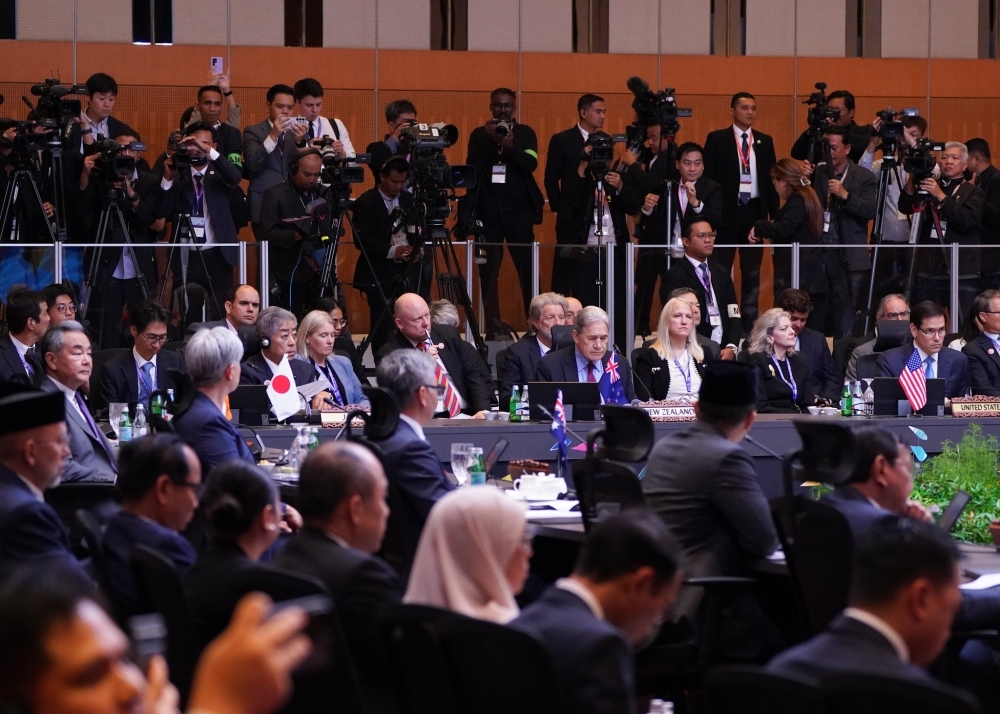Asia
The 15th East Asia Summit (EAS) Foreign Ministers’ Meeting
July 11, 2025


On July 11, commencing at 11:10 a.m. local time (12:10 p.m., JST) for approximately 130 minutes, the 15th East Asia Summit (EAS) Foreign Ministers’ Meeting was held in Kuala Lumpur, Malaysia. Mr. IWAYA Takeshi, Minister for Foreign Affairs of Japan, attended the meeting. The overview of the meeting is as follows.
1. General Remarks
The outline of Minister Iwaya’s statement is as follows:
- As the international community is becoming increasingly severe and uncertain, it is necessary to lead the region toward cooperation and dialogue rather than division and confrontation. The EAS plays an extremely important role in bringing key regional countries together and providing an opportunity for candid discussions on strategic issues.
- In addition to supporting ASEAN Centrality and unity, Japan fully supports the ASEAN Community Vision 2045 and the ASEAN Outlook on the Indo-Pacific (AOIP), and will promote concrete cooperation.
- The EAS is an open, inclusive, transparent and outward-looking forum. It is important that differences be resolved through dialogue and candid exchange of views.
- Japan would like to emphasize that maintaining and strengthening a free and open international order based on the rule of law is essential. Japan will work with EAS participating countries to promote concrete cooperation, in accordance with the principles including openness, inclusiveness, transparency, and a rules-based framework.
2. Regional and international issues
- Minister Iwaya stated outlined as follows:
- (i) The East China Sea, the South China Sea and Taiwan
Unilateral attempts to change the status quo by force or coercion are unacceptable anywhere in the world, including in the East China Sea. Japan is seriously concerned about the intensified actions in the South China Sea that increase regional tensions, including militarization and dangerous and coercive activities. It is crucial to achieve peaceful resolution in accordance with international law, in particular United Nations Convention on the Law of the Sea (UNCLOS). Peace and stability across the Taiwan Strait is important not only for the region but also for the international community. - (ii) North Korea
Japan is seriously concerned about North Korea’s nuclear and missile development, its malicious cyber activities, including cryptocurrency thefts, which fund these developments, as well as the advancement of the military cooperation between Russia and North Korea. The complete denuclearization of North Korea in accordance with Security Council resolutions is necessary, and Japan aims to work closely with others, including on the full implementation of the UN Security Council Resolutions. Japan calls for the continued understanding and cooperation from each country toward the immediate resolution of the abductions issue. - (iii) Myanmar / countering international organized crime
Japan is deeply concerned about the situation in Myanmar. Japan strongly urges Myanmar to implement the ceasefire and to make the progress in dialogue. Japan will also continue to collaborate with other countries to address transnational organized crime, including organized fraud. - (iv) The Middle East
Peace and stability in the Middle East is extremely important for Japan. It is vital to secure a lasting ceasefire between Israel and Iran and to resolve Iran’s nuclear issue through dialogues. Regarding the crisis in Gaza, all parties must return to negotiations and sincerely work towards a ceasefire, the release of hostages, and an improvement in the humanitarian situation. Japan will continue to make every diplomatic effort. - (v) Russia’s aggression against Ukraine
Russia’s aggression against Ukraine is a grave violation of international law. Attacks against civilians and civilian infrastructure must be strongly condemned above all. It is important that the various ongoing diplomatic efforts will lead to a full ceasefire, and by extension, to the realization of a just and lasting peace in Ukraine.
- (i) The East China Sea, the South China Sea and Taiwan
- Remarks from other participating countries
Other EAS participating counties expressed concerns about the situations in the East China Sea and the South China Sea. They emphasized the importance of the freedom of navigation and overflight and the peaceful resolution of disputes in accordance with international law. They also emphasized the importance of the peace and stability across the Taiwan Strait.
Regarding North Korea, many countries emphasized the importance of its complete denuclearization and full implementation of relevant United Nations Security Council resolutions. They also expressed concerns aboutthe advancement of North Korea’s nuclear and missile development as well as its military cooperation with Russia. Some countries also referred to the importance of the immediate resolution of abductions issue. As for Myanmar, many participating countries expressed serious concerns about the situation there and emphasized the importance of implementing the “Five-Point Consensus.”
Regarding the Middle East, many countries emphasized the necessity of an immediate ceasefire and humanitarian aid in Gaza.
As for the Russia’s aggression against Ukraine, other participating countries expressed serious concerns about the situation, condemned the aggression, and called for an early ceasefire.
[Attachment]
Chairman’s Statement (PDF) 

